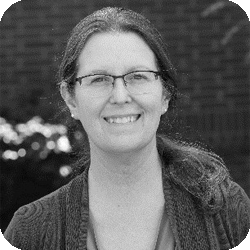Carol Rains-Heisdorf, M.Ed.
Former Senior Research and Planning Analyst,
Fresno City College
For nearly a decade, Carol Rains-Heisdorf has been essential to the growth and success of the Institutional Research, Planning, and Effectiveness department at Fresno City College.
Carol received her Bachelor of Arts in women's studies/victims services, magna cum laude, as well as her Master of Education in leadership and administration, with honors, from California State University, Fresno. She joined Fresno City College in 2014 and has served in many capacities, including Director of Institutional Research and Planning, Senior Research and Planning Analyst, and Planning Analyst.
During her tenure, Carol was known as one of the most student-focused and equity-minded individuals within the campus community and for her empathetic, kind, and steady leadership. She worked closely with the college’s Student Equity and Achievement Office to ensure that data were disaggregated and consistently helped in identifying gaps that students of color were experiencing. Carol also worked closely with faculty and classified professionals to ensure that they understood how to read and use data to inform their decisions and program reviews. Most importantly, she taught them how to use data to create solutions to serve students from marginalized communities. Her ability to communicate complicated and difficult data, concepts, and situations in kind and empathetic ways made a huge contribution to the institution.
In her role as interim Senior Director of Institutional Research, Planning, and Effectiveness, Carol was able to make many changes to the institutional research office to ensure the campus had more accessible data for campus decision-making. She hired additional researchers to work on specific equity projects and grants that now allow the college to always have access to data to ensure successful outcomes. As a result of her dedicated efforts, Carol helped to build one of the largest institutional research offices in the region.
In 2015, Carol conducted focus groups with students from disproportionately impacted student groups (African American, Latinx, Southeast Asian, and LGBTQ). This work helped better understand the lived experiences of students and shaped how she approached planning at the college. She served on various DEI committees and taskforces and was essential to the completion and approval of many important plans, including the Educational Master Plan, the 2017 and the 2021 Strategic Plans, the ACCJC Institutional Self Evaluation Report, Enrollment Management Plan, and various Student Equity Plans. As these important college-wide plans were developed, Carol ensured that every one of these plans included specific, measurable goals for increasing student success among these core student groups.
Carol always played an important role in campus planning and accreditation. She was a fierce advocate for change as a part of the college’s strategic planning process and worked to match the school’s Vision for Success goals and many other campus plans. She also played a crucial role in the five-year development of the college’s new governance structure and was instrumental in the implementation and evaluation during its pilot phase. She credits much of her professional success to skills learned while participating in The RP Group’s professional development activities, including the Leading from the Middle Academy, the Summer-to-Summer Institute, and the annual RP Conference and Strengthening Student Success Conference.
Carol spent hundreds of hours working with college units and programs to ensure they were making improvements that enable students to better achieve their educational goals. Additionally, she was tremendously instrumental in moving the college forward with Guided Pathways and student equity. As a manager, she was extremely invested in the professional growth and development of others, encouraging her staff to engage in equity and technical professional development, which transformed the way the department operated. Most of her work revolved around continuous assessment and improvement due to her substantial involvement in accreditation, program review, outcomes assessment, strategic planning, and college governance. The newly approved Fresno City College mission, vision, and core values now include transformative language that is socially just, anti-racist, and equity-minded, which would not be the case without Carol’s advocacy.
While her service spans across the college, including accreditation, participatory governance, and strategic planning, Carol Rains-Heisdorf has made positive contributions to the overall institutional effectiveness of Fresno City College, especially in advancing student equity and anti-racism. She has spent her whole career creating a positive atmosphere in which other team members can thrive, and she has an outstanding record of leading for positive change in her work on accreditation and strategic planning at the college and for the district.
It is with great pleasure that The RP Group celebrates her efforts with the 2023 IRPE Professional Leadership Award.